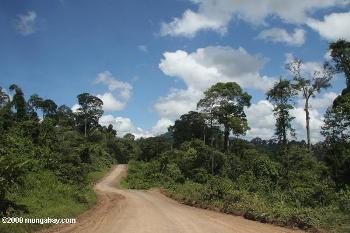75 percent of birds and dung beetles remain even after a forest is logged twice.
A new study in the Proceedings of the Royal Society B finds that forests which have undergone logging in the past, sometimes even twice, retain significant levels of biodiversity in Borneo. The researchers say these findings should push conservationists to protect more logged forests from being converted into oil palm plantations where biodiversity levels drop considerably and endangered species are almost wholly absent. Given that much of Borneo’s forests have been logged as least once, these long-dismissed forests could become a new frontier for conservationists.
“Whilst the value of primary habitat is undisputed and efforts to protect them are vital, the area of primary forest remaining in Borneo is rapidly diminishing and is increasingly fragmented,” lead author David Edwards explained to mongabay.com. “It is only with the inclusion of logged over, degraded forests that large-scale networks of protected areas can be maintained and the long-term viability of Borneo’s biodiversity guaranteed,”
Edwards and his team surveyed birds and dung beetles—the most “cost-effective indicator” species of biodiversity—in a primary forest, a forest logged once (where all the large marketable trees are removed), and in a forest logged twice in the Malaysian state of Sabah in Borneo. They found that over 75 percent of species remained even after two rounds of logging, although about half of the species experienced abundance changes.
“Logging rainforest shifts the make-up of species found, and in turn, relogging causes further changes,” Edwards says “However, despite these shifts in species, we find that relogged forests harbor similar numbers of bird and dung beetle species to primary forests and that over three quarters of the species found in primary habitat remain after relogging.”
 Logging road in Sabah, Borneo. Photo by: Rhett A. Butler. |
Edwards adds that he was surprised that biodiversity remained so high even after a forest was logged twice.
“The forest structure and canopy height of relogged rainforests are so dramatically different to primary forests that it is hard to believe that biodiversity will remain in high levels. But that is exactly what we do find.”
The study also found that birds endemic to Borneo (found no-where else) were unaffected by the first round of logging, but nearly half were impacted by the second. IUCN Red List threatened birds were also impacted by logging, but not nearly as much as by conversion into palm oil. According to the study, endangered birds had “a two hundred-fold higher abundance” in logged forest than in palm oil plantations.
While once or twice logged forests are often considered ‘degraded lands’ and so handed over to palm oil and other plantation companies for conversion, Edwards says this new study shows that logged forests hold vital conservation potential.
“Converting relogged forests to oil palm would come at a dramatic loss of biodiversity. Just focusing on the total numbers of species present would reveal a reduction from about 140 species in second rotation forest to about 30 species in oil palm. And those species lost include the vast majority of IUCN Red-listed species found in relogged forests.”
There is also the potential that once or even twice logged forests might eventually see the return of lost species. Edwards says that if, over time, logged forests begin to regenerate “then hopefully the 20-25% of bird and dung beetle species that are currently absent/very rare will also begin to recolonize and recover. Such an understanding of forest regeneration will also indicate whether degraded forests will need some assistance to aid their recovery via forest restoration techniques.”
The island of Borneo contains some of the Earth’s most biodiverse rainforests—over 16,000 species have been identified not including insects—but has lost half of its forest cover in the last 50 years to logging, plantations, and subsequent fires.
CITATION: David P. Edwards, Trond H. Larsen, Teegan D. S. Docherty, Felicity A. Ansell, Wayne W. Hsu, Mia A. Derhé, Keith C. Hamer and David S. Wilcove. Degraded lands worth protecting: the biological importance of Southeast Asia’s repeatedly logged forests. Proc. R. Soc. B published online 4 August 2010. doi: 10.1098/rspb.2010.1062.
Related articles
Oil palm plantations support fewer ant species than rainforest
(03/02/2010) Oil palm plantations support substantially less biodiversity than natural forests when it comes to ant species, reports new research published in Basic and Applied Ecology. Tom Fayle, a University of Cambridge biologist, and colleagues sampled ant populations in Danum Valley Conservation Area, a rainforest, and nearby oil palm plantations in Sabah, a state Malaysian Borneo. The researchers counted 16,000 worker ants from 309 species in the natural forest but only in 110 species at the oil palm plantation.
Planting figs could save endangered species in Borneo
(06/28/2010) In one of the most remote and undisturbed forests of Borneo, the Maliau Basin in the Malaysian state of Sabah, researchers picked a single fig tree (Ficus caulocarpa)
and surveyed the species feeding from it over a 5-day-period. Their findings, published in Tropical Conservation Science, shows that a fig tree over a short period of time feeds a high percentage of endangered species, prompting researchers to recommend replanting figs in disturbed forests as a way to save Borneo’s frugivores (fruit-eating species) from extinction.
Reforestation of rainforests sequesters more carbon than plantations
(08/03/2010) A new study in Ecological Management & Restoration has found that reforesting rainforest captures more carbon than monoculture plantation and even mixed species plantations. The research tested three projects in north-eastern Australia: a rainforest reforesting project using a variety of native trees, a mixed species plantation, and a monoculture plantation of conifers.
Scientists warn that Malaysia is converting tropical forests to rubberwood plantations
(06/24/2010) The Association for Tropical Biology and Conservation (ATBC) has condemned Malaysia’s booming practice of converting tropical forests into rubberwood plantations, arguing that the conversion threatens Malaysia’s biodiversity, endangered species, and releases significant greenhouse gas emissions.







